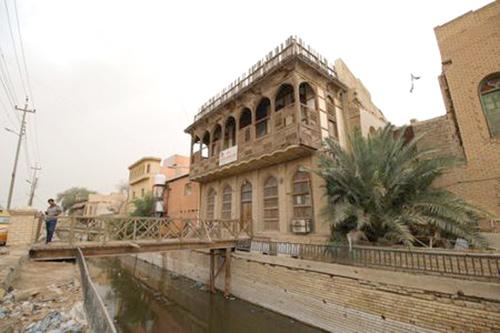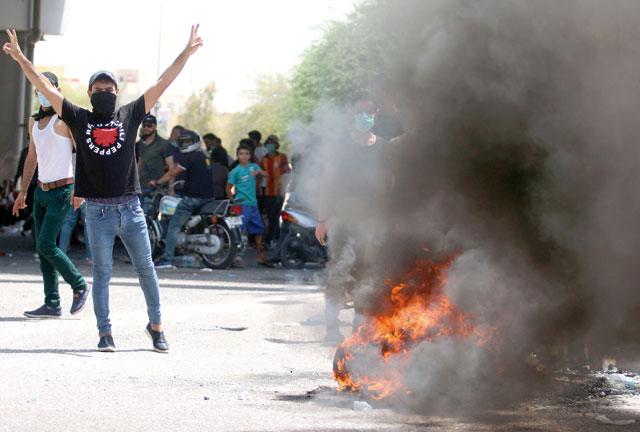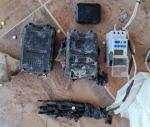You are here
In Iraq's crumbling Basra, a yearning for a glorious past
By Thomson Reuters Foundation - May 15,2018 - Last updated at May 15,2018

A general view of one of the ancient historic houses dated back to the time of Ottomans in the old downtown of Basra, Iraq, on May 9 (Reuters photo)
BASRA, Iraq — When Iraqi merchant Jabar Mohamed was growing up in the southern port city of Basra, he liked to watch boats gliding along a canal lined with palm trees and ancient buildings near his home.
Once dubbed the "Venice of the Middle East" for its network of canals, the 1,400-year-old city was a magnet for regional tourism until the early 1980s.
Today the cherished canal of Mohamed's youth is a reeking, refuse-filled cesspool, forcing passersby to hold their noses.
It is a showcase for the widespread breakdown of public services in a country plagued by turmoil, corruption and decay since the 2003 US-led invasion that toppled Saddam Hussein.
"Basra was once a wonderful place," said Mohamed, 52, who runs a grocery shop established by his father in 1966 in a street full of traditional dwellings that are falling apart.
"But we've had wars and neglect," he said, pointing to the illegible scrawl on a wooden post from the 1960s — the last time Iraqi authorities put up street signs in the city of 2.5 million people, Iraq's second largest, just upstream from the Gulf.
A shopping mall, some five-star hotels and elegant restaurants have sprung up in Basra since 2003 thanks to steady oil money, port facilities and an international airport.
Iraq, OPEC's second-largest producer, extracts most of its oil from southern fields and exports it through terminals in and around Basra — the engine of an expanding private sector with a middle class largely in work, unlike much of the rest of Iraq.
But since 2003, state authorities have not restored a single house in Basra's historic Old City, made up of Ottoman edifices famous for wood carvings on balconies, windows and ceilings.
State interest in preserving the Old City faded as Iraq went through a ruinous series of wars — with nearby Iran in 1980-88, and US-led coalition forces that ended Saddam's occupation of Kuwait in 1991 and then his rule in 2003. A UN embargo in place until 2003 helped lay waste to the oil-driven economy.
Only five historic residences were partially repaired in the 1990s and much of the remaining residential stock is at risk of collapse, according to Azhar Hashim, who runs Basra's historic heritage department.
Her office has carried out studies recommending restorations of scores of Old City residence. "But nothing has happened," Hashim said with a shrug.
Stifling mismanagement
State officials blame a public funding crisis wrought by years of low oil prices. But Basra residents blame profound neglect and corruption in public services over the past decades, worsening under the Saddam-era sanctions.
"It's mismanagement, corruption and theft [of public funds]," said Walid Mustafa, a retired soldier who grew up in an Ottoman house whose roof has collapsed.
Basra is one of the few cities in the Middle East without an effective water treatment system. It boasted an advanced sanitary infrastructure in the 1960s but it broke down decades ago, turning Basra's waterways into cesspools whose stench is compounded by a notoriously hot desert climate.
Even major roads are potholed while civic pride projects such as a "sports city" to host competitions were aborted.
Ali Al Ghasseb, chairman of the Basra Investment Commission, acknowledged mistakes after 2003 in repairing infrastructure.
But he said Basra province and the central government were now working to improve the sewage system thanks to a Japanese loan while a new hospital was being built with help of Kuwait.
The World Bank is also helping Iraq reduce severe air pollution arising from the gas flares of nearby oil fields.
Located at Iraq's marshy southern tip where the Euphrates and Tigris rivers merge near the Gulf, Basra was for centuries a melting pot of Arabs, Persians, Turks, Indians and Greeks who all left their cultural imprint.
Much of Iraq suffered destruction in the string of wars since the 1980s. But Basra was especially hard hit as a city on the front line of the war with Iran, only a few dozen kilometres across the Shatt Al Arab delta to the east.
More devastation occurred in the course of two uprisings by southern Iraq's majority Shiite Muslims against Saddam that were brutally crushed.
More recently, a drought has almost dried up canals while Basra is also often engulfed in smog blamed on oil production.
Tired of the state failing to restore historic buildings, local artists are trying to revive a once-vibrant cultural life.
At a refurbished Ottoman palace, art exhibitions and concerts are held as painters, poets and musicians have come back after many years of keeping a low profile to avoid Saddam's agents or, after his overthrow, extremist militants.
"We now have an event almost every day. Security has improved," said Abdelhak Al Mothafer, head of the state cultural centre in the palace.
But with few inclined to make their way through broken, garbage-strewn streets to the palace, painter Sabri Al Malek sat alone there one recent day waiting for buyers to show up.
"I have sold only three of 21 paintings," he said. "We don't have any tourists anymore like in the 1970s when Basra had its heyday."
Related Articles
BASRA, Iraq — Frozen in time for 20 years, two superyachts lie at the confluence of Iraq's Tigris and Euphrates rivers, bearing witness to t
BASRA, Iraq — Once dubbed the "Venice of the Middle East" for its canals, Iraq's crumbling port city of Basra is slowly dying of thirst.Cris
BASRA, Iraq — Iraqi police fired in the air to disperse hundreds of protesters who tried to storm a government building in Basra and demonst

















